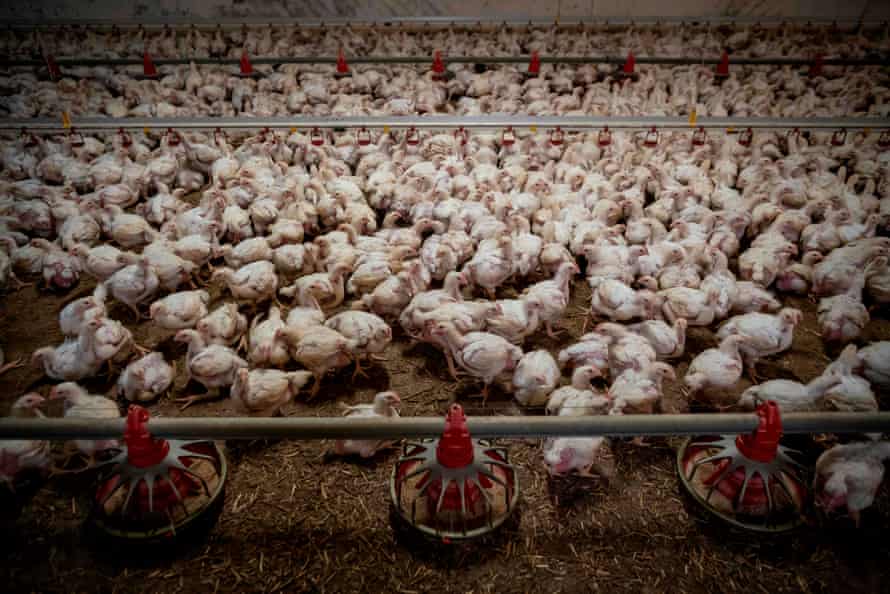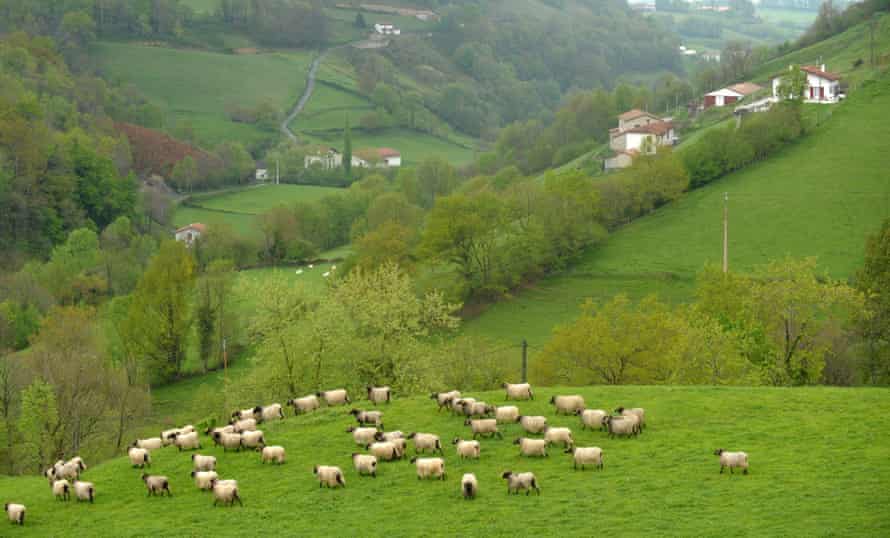Fewer, bigger, more intensive: EU vows to stem drastic loss of small farms | Farming
The EU is to introduce sweeping reforms of farming subsidies this week to try to halt the decline of small farms and protect them from the intensification of agriculture fostered by decades of previous policies.
Janusz Wojciechowski, the EU agriculture commissioner, said: “My intention is that this process of disappearing small farms should be stopped. The European food sector in the past was based on small farms, and it should be in the future as well.”
Analysis by the Guardian shows that the number of poultry and livestock farms alone in the EU, excluding Croatia, fell by 3.4m between 2005 and 2016, to 5.6m, the latest year for which comprehensive data is available. While poultry and livestock numbers increased over the period, the number of livestock farms declined sharply, showing that there has been a huge intensification of farming and that small farms have been lost. The total number of all types of farm in the EU fell during the same period from 14.5m to 10.3m.
This intensification, with more livestock gathered into a smaller number of farms, many of them large-scale factory-type facilities, accelerated with the EU’s common agricultural policy (CAP), which has dominated Europe’s farming since its introduction in 1962. The biggest farmers benefit most from the subsidy system: about 80% of the €40bn (£34bn) direct payment subsidies go to just 20% of farmers.
Wojciechowski admitted that previous versions of the CAP had produced vast upheaval. “The reason we lost 4m farms in the EU was a mistake in the CAP. The support was too much [geared] to industrial farming and not enough to small and medium farms,” he said.
Reforms to the CAP to be brought forward this week by the EU will include measures to encourage farmers to leave more space for wildlife, to adopt organic standards for livestock, to use less chemical fertiliser and pesticide, and to nurture healthy soils.
Wojciechowski told the Guardian: “Protecting small and medium farms is a priority. It is not true that we need bigger and bigger farms for food security. Small farms can ensure food security for EU citizens.”
He said small and medium farms could provide more than food, as well as environmental and health benefits: “There is an understanding among legislators, parliament and the EU council that we need to protect better our small and medium farms – it’s very important for food security, and better for the environment, climate change and biodiversity.”
European consumers would also feel the benefits, he said. “Exports are important, but we need to pay more attention to our own markets – high-quality goods from European farms to European markets. This is a big chance for European agriculture,” he said.
Animal welfare would also improve, he said, from a greater emphasis on short supply chains, which would reduce the long journeys across Europe for some live animals.
He added: “Our intention is to increase organic food from 8% to 25% in the next decade, for instance. This will be especially good for small farms.”
These reforms may stop some of the haemorrhaging of small farms in the EU, but a return to small farms across the bloc looks increasingly unlikely. The Guardian’s data analysis gives a glimpse of what has been far more than an economic transformation among small farms. In France, Germany and the Netherlands, more than a third of livestock and poultry holdings have disappeared since 2005. Nearly 120,000 poultry farms were lost in France between 2005 and 2016, and nearly 36,000 in Germany.
The impact of the CAP can be clearly seen in the acceleration of the decline of small farms among newer EU states. Among longstanding EU member states, the decline in the number of small farms has been going on for decades. But eastern European farmers have had even more upheaval since 2004, when many joined: since 2005, Bulgaria has lost 72% of its livestock and poultry farms, Hungary 48%, Poland 54% and Slovakia 72%.

In the UK, the decline over the 12-year period from 2005 to 2016 was 25%, with 45,500 livestock and poultry farms lost between 2005 and 2016. The loss was more than 110,000 from the 319,000 total of all farms in 1990.
The CAP, forged in the aftermath of the second world war with the intention of promoting food self-sufficiency in Europe, has rewarded increasingly intensive and industrialised farming methods. Farmers were encouraged to produce more food at any cost, using more chemical fertilisers and pesticides, and bringing livestock from small flocks and herds in fields into large-scale factory farms.
Food production increased, but the environment suffered. The number of farmland birds in the EU has halved in three decades, according to the European Bird Census Council. Insect populations have also plummeted: numbers in Germany declined by three-quarters in the past 25 years, according to a study of protected areas, and butterfly numbers on farmed land in England fell by 58% between 2000 and 2009. Only a quarter of species in the EU have good conservation status, and 80% of key habitats are in poor or bad condition, according to Europe’s environmental watchdog.
Attempts in the past two decades to encourage nature-friendly farming methods, such as leaving hedgerows intact and keeping field margins for wildflowers and wildlife, have had little impact, according to campaigners.
Rural culture has also been transformed, with people flocking to cities, leaving rural areas to wealthy second-homers, with farms abandoned in less productive areas and swallowed up by huge agri-food businesses in others.
“Niche producers offering sustainable farming practices survive haphazardly with the sale of their products to restaurants or small shops, or they sell their live animals outright. They’re cut off from the dominant market,” said Fabio Ciconte, director of the environmental organisation Terra.

Campaigners have warned that the CAP deal to be announced this week is likely to be “greenwash” rather than a real transformation of EU farm policy into one that is good for small farmers and the environment.
Célia Nyssens, policy officer at the European Environmental Bureau NGO, said: “EU farm policy is a juggernaut of public spending that could be transforming agriculture towards a sustainable future and turning the tide on catastrophic nature loss. Sadly, it looks like the deal this week will continue driving the tractor in the wrong direction. A majority of funds will continue flowing to the biggest, most polluting farms, with barely any green strings attached. In this crucial decade for climate and biodiversity, the lack of ambition of the new farm policy is downright disastrous.”
Research on data for this piece by Kunal Solanky
Sign up here for the Animals farmed monthly update to get a roundup of the best farming and food stories across the world and keep up with our investigations. And you can send us your stories and thoughts at animalsfarmed@theguardian.com
Source: theguardian.com

